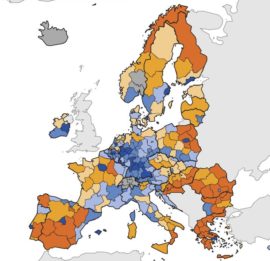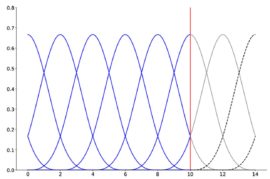- Fecha(s): 21/09/2023
- Lugar: Sala Seminarios CIO (UMH). Se grabará.
- Ponente: José Manuel Cordero, Universidad de Extremadura

Las variables de contexto o ambientales suelen desempeñar un papel importante en la mayoría de los procesos productivos, condicionando en gran medida tanto la estimación de los niveles de eficiencia de las unidades evaluadas como posibles factores explicativos de las ineficiencias detectadas en la mayoría de los estudios empíricos. Sin embargo, cuando se analizan los…
- Fecha(s): 04/09/2023
- Lugar: Sala Seminarios CIO (UMH). Se grabará.
- Ponente: Behzad Hezarkhani, University of Southampton

The tariff rate quota (TRQ) is a common market access instrument in global agricultural trade that allows a predetermined quantity of a product to be imported at a lower tariff rate than the rate typically applied to that product. In this study, we examine the design and administration of TRQ systems from an operations management…
- Fecha(s): 11/07/2023
- Lugar: Sala Seminarios CIO (UMH). Se grabará.
- Ponente: Vanessa Guerrero, Universidad Carlos III

Abstract In an era when the decision-making process is often based on the analysis of complex and evolving data, it is crucial to have systems which allow us to incorporate human knowledge and provide valuable support to the decision maker. During this talk, statistical modelling and mathematical optimization paradigms merge to address the problems of,…
- Fecha(s): 16/06/2023
- Lugar: Work-Café - Facultad de Economía y Empresa - Universidad de Murcia
- Ponente: Miguel López Morell, Bernardo Batiz-Lazo

Abstract Topic: Revisit the extant literature on the growth of Spanish banks in Latin America through the analysis of the processes of IT integration. We explore the technological and management issues around the implementation of global platforms (developed by either third parties or at head office) which replaced, interfaced or co-existed with pre-existing local IT…
- Fecha(s): 01/06/2023
- Lugar: Seminario del Departamento de Fundamentos del Análisis Económico - Universidad de Murcia
- Ponente: Santiago Sánchez Pagés

An extensive literature has studied both in the field and in the lab the effects on performance of providing absolute and relative verifiable feedback, finding mixed results. Another branch of the literature has studied the effects of non-verifiable centrally-provided feedback, also with mixed results. But, to the best of our knowledge, no study has explored…
- Fecha(s): 01/06/2023
- Lugar: Seminario del Departamento de Fundamentos del Análisis Económico - Universidad de Murcia
- Ponente: Íñigo Iturbe Ormaetexe

Systematic biases in return expectations may distort stock prices and lead to inefficient capital allocation. In this paper, we report experimental evidence that buying a stock induces optimistically biased expectations when its price drops below the purchase price. We find this effect in a controlled laboratory experiment as well as in a six-week-long online experiment…
- Fecha(s): 11/05/2023
- Lugar: Online (el enlace se proporcionará a través del Aula Virtual)
- Ponente: Bernardo Batiz-Lazo

Abstract Debit card payments are the cornerstone of the cashless economy. They exemplify the transfer of monetary balances, enabling on-the-spot transactions through online, real-time, electronic networks. While debit cards were an aspiration in the 1960s, it was during the mid-1970s that the first significant attempts were made to make these aspirations a reality in the…
- Fecha(s): 27/04/2023
- Lugar: Seminario del Departamento de Fundamentos del Análisis Económico - Universidad de Murcia
- Ponente: Vicente Calabuig (Universidad de Valencia)

Abstract This paper theoretically explores the role of elites in the rise of progressive taxation in Western countries at the beginning of the XXth century and in its posterior erosion in the last four decades. We focus on its interaction with the level of inequality between the elite and the citizens. We analyse a stylized…
- Fecha(s): 26/04/2023
- Lugar: Sala de seminarios de Economía aplicada (Facultad de Economía y Empresa) - Universidad de Murcia
- Ponente: Víctor Luque de Haro (Universidad de Almería)

Resumen A lo largo del siglo XIX se produjo en el ´ámbito europeo un considerable aumento de las migraciones exteriores e interiores. Tradicionalmente la historiografía ha considerado que en España los movimientos migratorios permanentes, tanto internos como externos, durante la mayor parte del siglo XIX fueron relativamente débiles en comparación con las de otros países…
- Fecha(s): 19/04/2023
- Lugar: Sala de seminarios de Economía aplicada (Facultad de Economía y Empresa) - Universidad de Murcia
- Ponente: Parinya Nakpathom (University of Burapha)

Abstract This study seeks to explore the main factors influencing Thai female consumers purchasing behavior and identify the relationship between consumer behavior and sales objectives of Korean Cosmetic brands I. The data was collected in the form of an online questionnaire which was divided into 5 subsections. This was followed by 1) Demographic data 2)…











